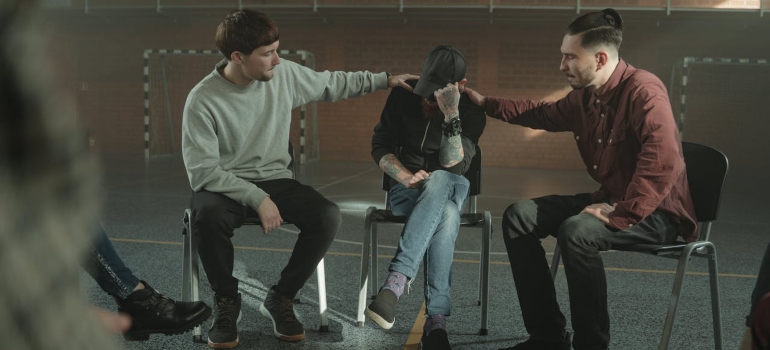Starting addiction therapy can feel overwhelming, especially if it’s your first time entering a recovery program. One of the most well-known and widely used approaches is the 12-step program, which has been the foundation for countless recovery stories. But what can you expect during your first 12-step meeting? How does it work? And what are the benefits of attending these addiction recovery meetings? We will guide you through the basics of the 12-step program, what happens during a typical meeting, and the challenges you might face. You’ll also learn about the effectiveness of this approach and explore alternatives so you can make an informed decision about your journey toward recovery.
The Hardest Part is Starting
Enlisting the help of a substance addiction treatment program is a significant step toward recovery, one that entails considerable strength. The thought of coming face to face with your demons and transforming your lifestyle in extraordinary ways may bring about various emotions, including hope, anxiety, and possibly fear. Group addiction therapy has long played an essential role in the treatment of substance use disorders. While it might seem frightening, challenging, and even painful to participate at first, most members realize that group therapy is beneficial.

Once you are ready, the 12 step program for addiction therapy is designed to guide you through the following days. As well as the rest of your life. We’ve seen 12 step meetings played out in movies, often portraying dark lit rooms with cheap coffee. Everyone has a harrowing tale of woe and everyone looks annoyed to be there. In reality, this couldn’t be further from the truth.
If you’re attending your first 12-Step meeting, it’s important to understand that nothing is expected of you. And to be honest, the coffee is usually pretty good. One thing that Hollywood does get right is that almost always, 12 step meetings are portrayed as a key part of our hero’s journey from a life of addiction to a life of sobriety. Are you at that point in your story? If you’ve found this blog, chances are you’re close to that scene.
What are you supposed to do? How will you be received? Stepping into a meeting full of strangers can be a nerve-wracking experience, especially for someone who Is newly sober and just starting the recovery process. Here are some things you can expect from your first 12 step meeting.
You have to expect things of yourself before you can do them.
– Michael Jordan –
What Is the 12-Step Program?
The 12-step program was created in 1935 by the founders of Alcoholics Anonymous (AA). It was initially designed to help people recover from alcoholism, but over the years, it has been adapted to address many other types of addictions, including narcotics, gambling, and food-related issues.

At its core, the 12-step program is built around the idea of personal responsibility and spiritual growth, though it’s important to note that the term “spiritual” doesn’t necessarily mean religious. Many people interpret the higher power mentioned in the steps in different ways, allowing for flexibility in beliefs. The 12 steps are as follows:
- We admitted we were powerless over our addiction—that our lives had become unmanageable.
- Came to believe that a Power greater than ourselves could restore us to sanity.
- Made a decision to turn our will and our lives over to the care of God as we understood Him.
- Made a searching and fearless moral inventory of ourselves.
- Admitted to God, to ourselves, and to another human being, the exact nature of our wrongs.
- Were entirely ready to have God remove all these defects of character.
- Humbly asked Him to remove our shortcomings.
- Made a list of all the persons we had harmed and became willing to make amends to them all.
- Made direct amends to such people wherever possible, except when doing so would injure them or others.
- Continued to take personal inventory, and when we were wrong, promptly admitted it.
- Sought through prayer and meditation to improve our conscious contact with God as we understood Him, praying only for knowledge of His will for us and the power to carry that out.
- Having had a spiritual awakening as the result of these steps, we tried to carry this message to others and to practice these principles in all our affairs.
How Long Do the 12 Steps Take?
The duration of time spent working through the 12 steps varies widely from person to person. Some people move quickly through the steps, while others take their time. There is no set timeline. It’s important to understand that the 12-step process is a lifelong journey, not something to be rushed.
- Step 1: Admitting you have a problem – This first step of 12 step program requires deep reflection and honesty.
- Step 2: Believing in a higher power – Coming to believe that a power greater than yourself can help you recover.
- Step 3: Turning your will over to a higher power –This step often takes time, especially if you’re used to trying to control everything on your own.
- Step 4: Taking a personal moral inventory – You’ll spend time looking at your behaviors, actions, and decisions that have led to addiction.
- Step 5: Admitting wrongs to yourself and others – Some people need extra time to feel ready to confess their wrongs to another person.
- Step 6: Becoming ready to have defects removed – It can take time to become truly ready to let go of behaviors and flaws that have been part of your life for so long.
- Step 7: Asking for your defects to be removed – You’ll ask your higher power to remove your shortcomings.
- Step 8: Listing those you’ve harmed – Making a list of people you’ve hurt through your addiction can take time and reflection.
- Step 9: Making amends where possible – You may need weeks or months to find the right time and method to make amends.
- Step 10: Continuing to take personal inventory – Involves regularly reflecting on your behavior and admitting when you’re wrong.
- Step 11: Seeking spiritual growth – Through prayer or meditation, this step encourages ongoing spiritual development.
- Step 12: Carrying the message to others – Focuses on helping others through their recovery.

The Purpose of Attending a 12-Step Meeting
Substance use disorders affected nearly 50 million Americans in the previous year. One of the main purposes of attending 12-step meetings is to provide a supportive and non-judgmental environment for those battling addiction. Addiction therapy works best when you have a network of people who understand your struggles.
This is exactly what a 12-step group offers—a community where you can share your experiences, learn from others, and hold each other accountable. The group dynamic is very important because it allows participants to connect with people facing similar challenges. The 12 step group therapy for addiction emphasizes mutual support, which is key in helping people stay committed to their recovery. Each meeting provides a safe space to talk about setbacks, celebrate successes, and stay motivated.
In many addiction recovery meetings, there is an element of anonymity, meaning that what is shared in the group stays within the group. This confidentiality helps create a safe and open environment where participants feel comfortable sharing their most personal and difficult experiences. Alongside group meetings, individual therapy for addiction can provide personalized support, helping you address underlying emotional and psychological issues that contribute to substance use.
Preparing for Your First 12-Step Meeting
Attending your first 12-step meeting can feel nerve-wracking, but knowing what to expect can ease some of the anxiety. Here’s how to prepare:
- Emotional preparation: You may feel nervous or unsure, but that’s okay. Many newcomers feel the same way. You don’t have to say or do anything you’re uncomfortable with in the first meeting.
- Anonymity and privacy: 12-step meetings emphasize anonymity, so you don’t need to worry about your identity or personal details being shared outside the group.
- What to bring: You usually don’t need to bring anything specific to a meeting. Just come with an open mind and a willingness to listen.
- Group structure: Meetings follow a typical structure, which often includes opening readings from program literature, personal sharing from participants, and closing reflections. Some meetings focus on a specific step or topic, while others are open discussions.

Being prepared can help reduce your anxiety and allow you to focus on what’s being shared. Many people just listen during their first meeting, and that’s perfectly fine. Therefore, the West Virginia treatment center recommends that you participate at your own pace.
Hello, My Name is…
If you are under the impression that each meeting starts with everyone going around the room and stating their name and some admission of guilt for your addiction, you’re not alone. But you are a little off base. While yes, when someone is speaking during the meetings, they will introduce themself by name and acknowledge they are an alcoholic.
But there is no requirement that you speak during this addiction therapy. During your first few meetings, you can participate as much or as little as you like. It is important to remember that the purpose of the meetings is to engage with the other members and grow from experiences together.
The Meeting Environment
When you arrive at your first addiction meeting, the environment will likely be welcoming and supportive. Meetings are often held in community centers, churches, or rehab facilities. Everyone in the room has been where you are, so there’s no need to worry about judgment.
Meetings can be open or closed. Open meetings are available to anyone, even if they aren’t struggling with addiction themselves. These can be great for family members who want to learn more about the recovery process. In this type of cases, family therapy for addiction can be beneficial, too. Closed meetings are reserved for individuals who are currently dealing with addiction or are in recovery. Open or closed meetings may have:
- A speaker who shares his/her specific story.
- A general discussion meeting.
- A study meeting where sections of the Big Book are reviewed.
- Beginner meetings are also held, typically involving an introductory Q&A format.
You’ll also likely hear about the importance of sponsors. A sponsor is someone who has completed the steps and can offer guidance, support, and accountability. Sponsors play a vital role in helping newcomers work through the steps and stay engaged in the program.

The Role of Sponsors in Recovery
Sponsors are the foundation of the 12-step program. A sponsor is a more experienced member of the group who has completed the steps and can offer personal mentorship. They help guide newer members through the steps, offering advice and emotional support. Here’s how sponsors can help:
- Guidance through the steps: Sponsors walk you through each step and help you understand what’s required.
- Accountability: Having someone hold you accountable increases your chances of sticking with the program.
- Support during tough times: Sponsors provide emotional support when things get difficult or when you feel like giving up.
Choosing a sponsor is an important decision, and it’s okay to take your time finding someone who feels like the right fit. Building trust with your sponsor can make a huge difference in your recovery journey.
How Effective is the 12-Step Program?
The effectiveness of the 12-step program has been a topic of research and debate for many years. However, numerous studies on 12-step Interventions and Mutual Support Programs for Substance Use Disorders suggest that for many people, the 12-step model is an effective way to achieve long-term sobriety. Many people struggling with certain dependencies find a medication assisted treatment West Virginia to be an effective option when combined with 12-step meetings to support long-term recovery. Here are a few reasons why the 12-step program works for so many people:
- Community support: The social aspect of addiction recovery meetings provides a strong network of support, reducing feelings of isolation.
- Personal responsibility: The steps require people to take accountability for their actions, which can be empowering and transformative.
- Spiritual and emotional growth: The program encourages both spiritual and emotional healing, which can be crucial for maintaining sobriety in the long run.

However, it’s important to note that the program’s effectiveness depends on your commitment to the steps and the support of the group. Consistent attendance and active participation are key to getting the most out of the program. It’s also important to understand the different levels of care in addiction treatment so you can find the right support based on your specific needs, whether that’s inpatient rehab, outpatient programs, or ongoing support through 12-step meetings.
Feedback From Peers
One of the most beneficial aspects of addiction group therapy is the chance to receive feedback from peers. Often, members will be more open to the feedback they get from other members than to the information they get from their therapist. This is mainly due to the thought that other group members can relate to their struggles more quickly than their therapist can.
Common Terms You’ll Hear in a 12-Step Meeting
When attending your first meeting, you’ll likely hear some common phrases and terms that may be unfamiliar to you at first. Understanding these will make it easier to follow along and participate:
- Higher Power: This term refers to the spiritual aspect of the program. However, it doesn’t necessarily mean religion. Your higher power can be anything you believe in, whether it’s God, nature, or even the group itself.
- Amends: This refers to steps 8 and 9, where you make a list of people you’ve harmed and work to make things right with them.
- One day at a time: A popular phrase that emphasizes the importance of focusing on today rather than worrying about the future.
As you continue attending meetings, these terms will become second nature, and you’ll begin to feel more comfortable sharing and participating.
The Importance of Sharing
Sharing your experiences is a big part of addiction recovery meetings. While it’s not mandatory, many people find that sharing helps them process their feelings, connect with others, and stay accountable.

If you’re not comfortable sharing during your first few meetings, that’s perfectly fine. You can attend and listen until you feel ready to speak. Listening to others can also be very beneficial, as you’ll hear stories that resonate with your own experiences and struggles. Sharing helps build trust and community within the group, and it’s an important part of the healing process. Implementing these strategies to break recurrent substance use patterns can help maintain sobriety and prevent relapse.
After the Meeting: What Happens Next?
Once you’ve attended your first meeting, you might feel a mix of emotions—relief, exhaustion, hope, or even uncertainty. These feelings are normal. The important thing is to keep attending meetings regularly, as consistency is crucial in addiction therapy. Here’s what you can do after your first meeting:
- Reflect on the meeting and think about what you learned.
- Connect with others. Many groups encourage members to talk and socialize after the meeting, providing a chance to build relationships.
- Continue attending. Make meetings a regular part of your recovery routine. Whether you’re attending meetings regularly or seeking additional support from a long term drug rehab WV program, staying engaged in your recovery process will increase your chances of lasting sobriety.
The support you receive in these meetings can help you stay focused on your goals and continue making progress. Attending regular meetings and sharing your experiences with others are important parts of building resilience in recovery, helping you stay strong through challenges and setbacks.
When Do I Need a 12-Step Program?
The decision to join a 12-step program usually comes when you realize that you need help to overcome addiction. Here are some signs that it may be time to seek help from a 12-step program:
- You’ve tried to quit on your own and failed: Many people turn to the program after multiple attempts to quit on their own haven’t worked.
- You feel isolated: If you’re feeling alone in your addiction, the support and community found in 12-step meetings can help.
- You’re ready to take responsibility for your recovery: The 12-step program requires a commitment to personal growth and accountability.
If any of these situations apply to you, attending your first addiction meeting could be the start of a new chapter in your recovery journey.

Alternatives to the 12-Step Model
While the 12-step program is one of the most widely used forms of addiction therapy, it’s not the only option available. Some people may prefer alternatives that don’t involve the spiritual or community-based elements of the 12-step approach. Moreover, some people find that holistic therapy for addiction, which focuses on healing the mind, body, and spirit, can be a valuable complement to traditional 12-step meetings. Here are some alternatives to consider:
- SMART Recovery: A science-based program that focuses on self-reliance and behavioral changes.
- Cognitive Behavioral Therapy (CBT): Cognitive Behavioral therapy for substance use disorders helps individuals identify and change harmful thought patterns that lead to substance use.
- Refuge Recovery: A Buddhist-inspired program that emphasizes mindfulness and meditation as tools for recovery.
Choosing the right program depends on your personal preferences and needs. Some people may find that a combination of 12-step meetings and other therapies works best for them. Programs that offer rehab for loved ones help families and friends understand addiction better, providing the tools they need to offer support without enabling destructive behavior.
Benefits of the 12-Step Program for Long-Term Recovery
One of the main reasons people continue to attend 12-step meetings even after years of sobriety is the long-term benefits it provides. Regular attendance at addiction recovery meetings helps maintain sobriety and provides a structure for continued personal growth. The benefits include:
- Accountability: Knowing that others are counting on you to attend and share helps keep you on track.
- Community: The friendships and relationships you build in these meetings offer ongoing support.
- Personal growth: The steps encourage you to continuously improve and reflect on your behavior, even years into recovery.
For many, the 12-step program becomes a lifelong commitment, not just a temporary solution. It helps reinforce the principles of recovery and keeps people connected to a supportive community.

How to Find the Right 12-Step Meeting
If you’re ready to attend a 12-step meeting, the next step is finding the right group. Not all meetings are the same, and finding one that fits your needs is important. Here are some tips to help you choose the right meeting:
- Look for local meetings: Many groups meet in person at churches, community centers, or rehab meetings. Some are virtual, which can be convenient if you can’t attend in person.
- Try different groups: Every group has its own personality. Don’t be afraid to try different ones until you find one that feels right.
- Consider open vs. closed meetings: Open meetings allow anyone to attend, while closed meetings are reserved for those actively struggling with addiction or in recovery.
The right group can make a huge difference in your recovery, so take the time to find one where you feel comfortable.
Moving Forward with Addiction Therapy: Your Path to Recovery with 12 Step Meetings
Attending your first 12-step meeting is a major step in your addiction therapy journey. These meetings provide a supportive environment where you can connect with others who share similar struggles and goals. The 12-step program offers a structured path to recovery built on personal accountability, spiritual growth, and mutual support. If you’re considering entering a 12-step program, take that first step and find a local meeting. Recovery is a lifelong process, but with the help of a meeting for addicts, sponsors, and the supportive community within the 12-step group, you can build the foundation for a healthier, addiction-free life. For more information on addiction recovery and treatment options, contact us today!
Reference:
2024 Addiction Statistics: Accurate Data on Substance Abuse in the US



